Covid19 takes a big bite out of street food vending
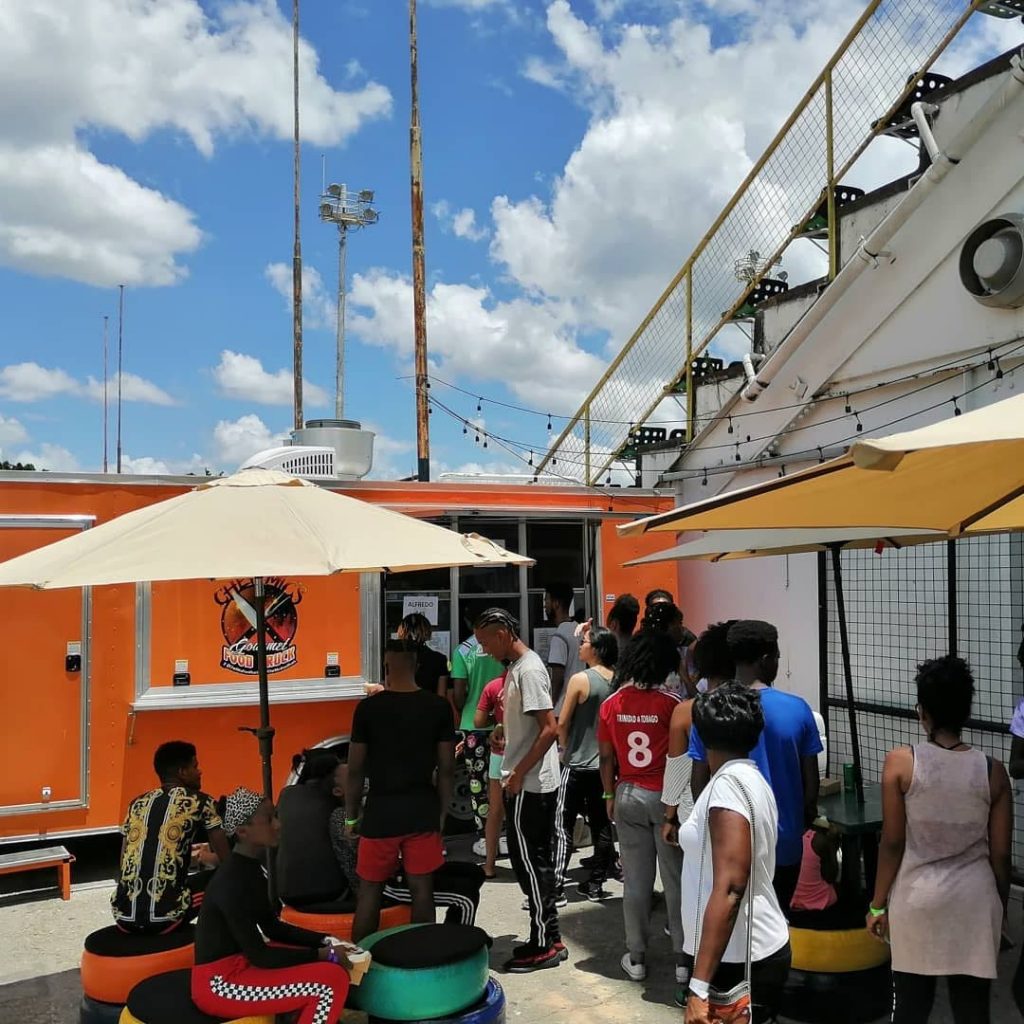
Roadside food vending has been at the centre of TT's culinary culture for as long as one could remember. Doubles, pies, barbecue, and in recent history gyros, satisfy cravings, whether on the way to work or out liming at night.
But the industry is volatile. Crime, the price of goods and the fact that the street food sector is not regularised adds to the high risks involved, and, with the recent covid19 restrictions many vendors who operate on a day-to-day basis, may fall by the wayside.
Michel Peters, the 44-year-old owner of Chef Mike’s food truck, told Business Day that the industry itself is resilient because of a revolving door of operators. He said people have misconceptions about the industry which lead them to getting into the industry without understanding the risks.
“People who lost their jobs during covid19 pivoted toward the roadside food industry, because there is always the thinking that food has money in it. But this is hard work. You need a lot of finances to get it going. It takes a long time to get established.
“Most restaurants fail in the first 12 months – and that was before covid19. I have seen people open restaurants and in two weeks the business failed.
For Peters, the risk of getting into the food truck business was one of many he has taken throughout his life. A former under-20 and under-25 national footballer, who also played for teams like San Juan Jabloteh, Peters said he decided to go into the food business because local football was not paying well.
After graduating with a bachelor's in business management at St Francois College in New York, he enrolled in the TT Hospitality and Tourism Institute to study the culinary arts.
“I always loved cooking and enrolling in hotel school taught me what I didn’t know about the business and get experience as well.”
He got the experience working at restaurants like L’orchidee and Crews Inn, as well as on jobs that took him all over the world.
“I once got a job cooking for some fishermen from Louisiana. We ended up on Ascension Island (2,500 miles away from Rio de Janeiro, Brazil). When I came back I started work at the Carlton Savannah, when we hosted the Queen (Elizabeth II).”
It was while he was at Carlton Savannah he decided to start his own business. He realised that the ideas he had in the kitchen were great, but once he worked for someone else his ideas would only benefit his bosses.
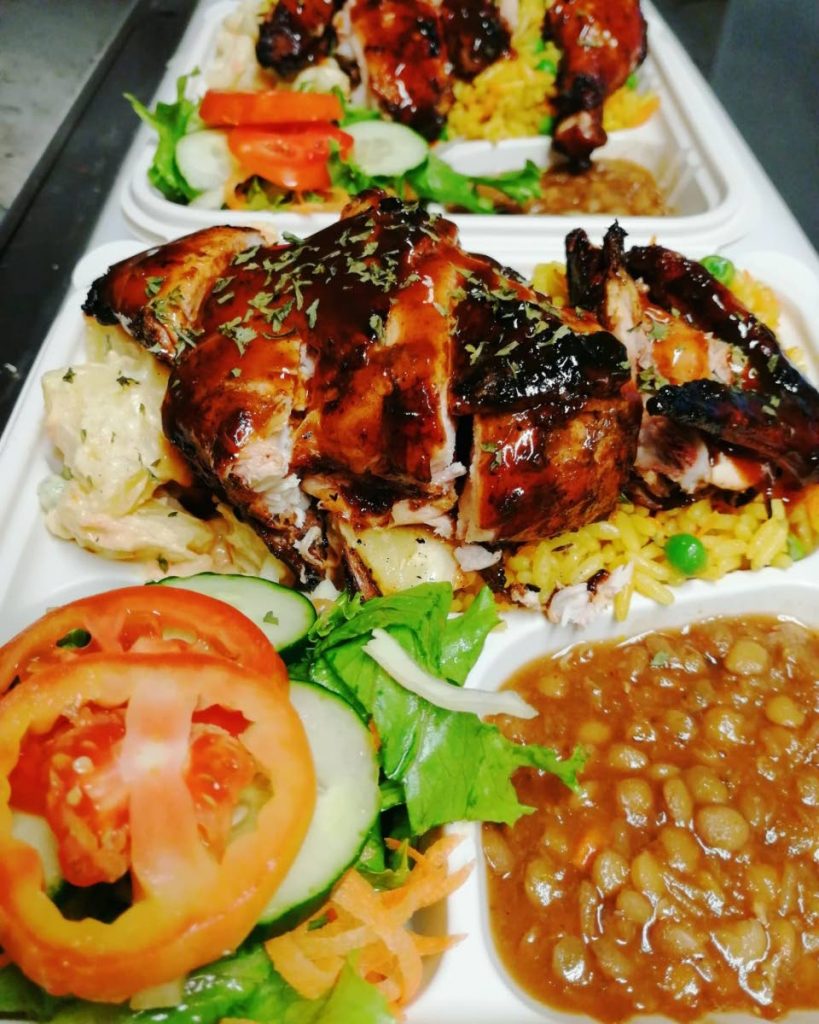
“I wanted to bring restaurant quality food to the streets at an affordable price,” Peters said.
From the beginning, getting into the food truck business was risky.
“I did not know what the need was. Plus there were financial risks involved in getting into business in TT.”
He said he got a first-hand experience in his first venture – a food cart – where he reached out to a fabricator and paid him a deposit to build a hot dog cart. That was in 2010. Peters said, to date, he is yet to get the cart.
But his food truck business which he started a few years ago quickly took off. His first truck, which had table top burners bought from Price Smart, was too small for the demand which grew in nine months’ time.
“During peak hours some people would have had to wait for as long as an hour to get their food. In the food service industry that was unacceptable.”
He expanded to a larger truck outfitted with burners and a water supply. Then, in 2019 he got his third truck, which was basically a kitchen on wheels – with a stove, oven, water and sanitation.
Peters said the largest of the trucks saw success in 2020 Carnival. He took the truck to fetes and concerts like Bayside and Kes’ Tuesdays on the Rocks but even at these events there were risks.
“It is only during the first and the last hour that you can make money at events like that,” he said. “Otherwise people are more busy partying.”
For Araby Ali, owner of Araby Ali’s Doubles, getting into the roadside food business was a matter of tradition.
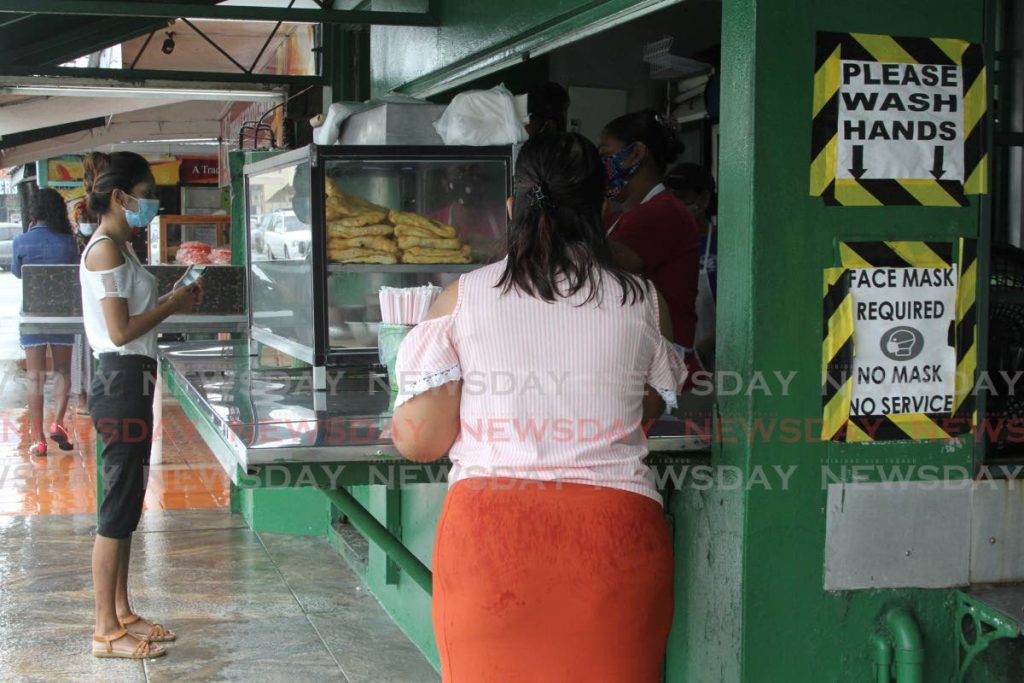
As a third-generation doubles vendor, Ali said the family business is about 80 years old, dating back to the origins of the local delicacy in 1939.
“I have been a doubles man all my life,” Ali told Business Day.
His grandfather, Ashraff “Chote” Ali was one of the pioneers of doubles. Ali said his grandfather would leave Princes Town and go to the sugar cane barracks to sell.
Those days, he said it was called a barra and channa sandwich. He said it was when his father started selling to Naparima Girls' High School students, they began asking the vendors to “double” the barra.
Ali said after his family business won the Lotus fry-out in Maracas in 1995 they moved their business from Princes Town to City Gate in Port of Spain. They sold at that location for 12 years and in 2002 they moved to Barataria. His parents, Korisha and Anwar Ali, ran the business back then, but in 2008, Ali took over and had his parents retire.
For Ali, Peters, as well as the rest of the world, the covid19 pandemic came out of nowhere. “The pandemic hit me hard,” he said. “I have no insurance, or any financial nest egg in place.”
Ali was able to work day-to-day during the pandemic regardless of the restrictions, but, for Peters covid19 meant that his wife and one of his two children were at increased risk, as they both people have pre-existing conditions, and he couldn’t chance bringing the virus to his family.
He moved his truck from its location on Eddie Hart Grounds in Tacarigua and stationed it in Barataria where he renamed the business Ivy’s after his grandmother.
Peters said while there were signs of decline in the food truck industry, there was little that businesses could have done to adapt, because they did not have the financial backing that premier food businesses had.
“Depending on your business, you may not be that attractive to banks. So some businesses would not have the finances to pivot even when they see something coming. They would have to just ride it out or move on to something else.”
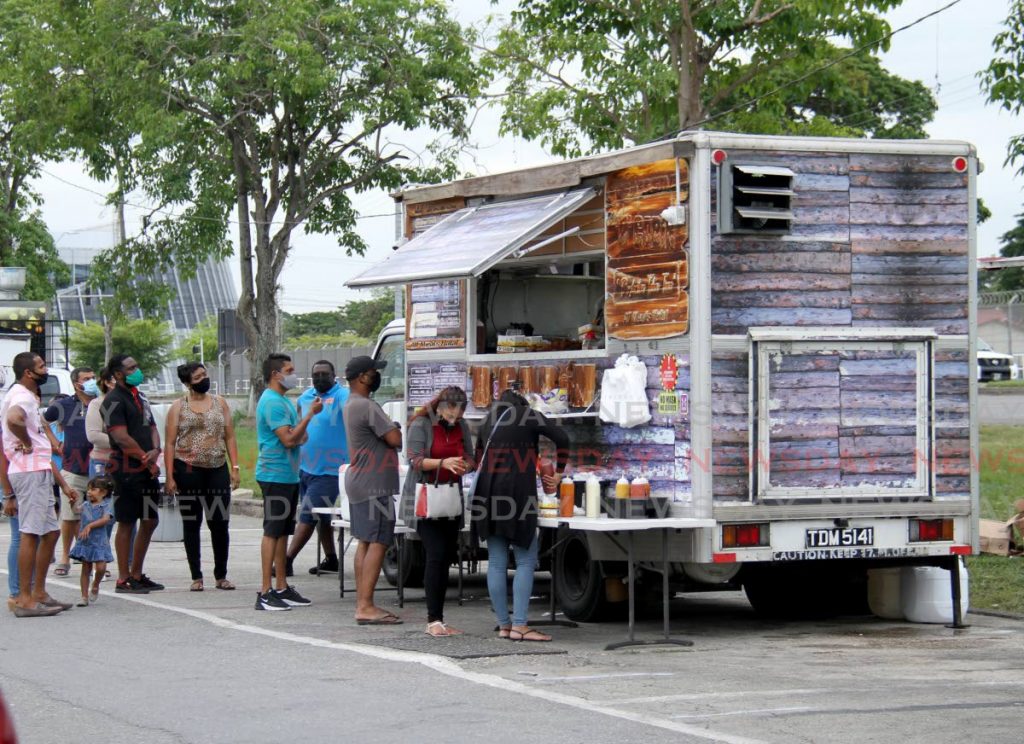
Peters said he plans to change once again and invest in frozen foods and sauces.
“That way, people who have concerns with coming out could go get to the food that way.”
Ali has no plan B. He does, however, have bills. He said aside from loans and taxes, he also has to pay staff along with national insurance and health surcharge.
That coupled with the rising prices of ingredients, Ali said it was becoming all the more difficult to maintain a price of $5 for doubles.
“In my grandfather’s time, doubles was 10 cents. I remember personally when it was 50 cents. But now, the price should be more than $5. Channa is rising. It was $275 to make enough to serve people for the day but now it goes for about $350. Pepper depends on the weather. It used to be about $100 for a bag, but that same bag goes for $300 to $400 now.”
These risks and challenges were prevalent before Monday when a surge in cases led the Prime Minister to announce that roadside vending would be discontinued for the next three weeks.
Last Thursday, Keith Rowley announced that restaurants, diners, night clubs and casinos would all be closed leaving roadside food vendors the only source of meals outside of cooking at home.
As a result, food vendors were flooded with hungry customers who would have otherwise patronised the restaurants.
Ali and Peters were not surprised by the public’s reaction and Rowley’s shut down of roadside food.
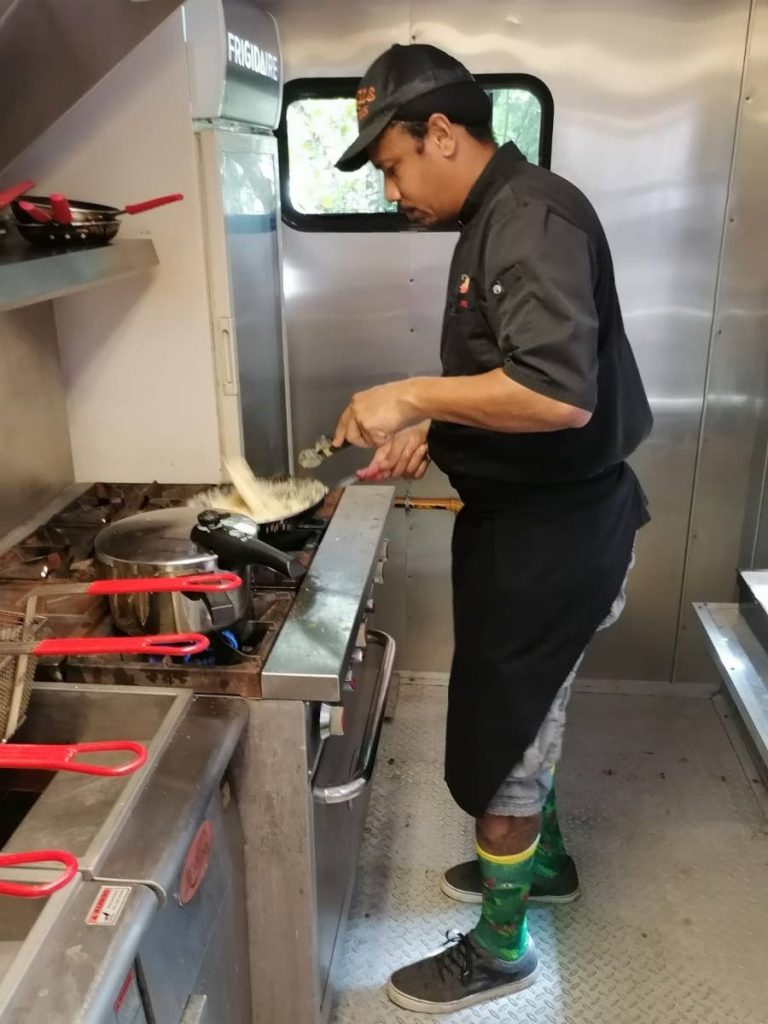
“I was expecting it (the shut down). But the Prime Minister could have been more lenient. He could have told businesses to close their doors and operate with delivery or drive-through or pick-up services. But when it was announced that the bigger companies could not have done anything, and they tried to pivot by coming out with roadside vending of their own, I think that contributed to the long lines over the weekend.”
“You didn’t have to be in the industry to anticipate the crowds,” Peters added. “From the day after the announcement you could see the increase in numbers. Even if we tried to space them out, the number of people was too high. I was actually surprised it took more restrictions to be put in place. From the time we saw the crowds we knew that was it for street food.”
Now with no food businesses operating, Ali is concerned about the losses which come not only in the form of finances and ingredients but human resources as well.
“All of my goods are perishable goods. The aloo for example, that cannot last the three weeks. On top of that not every employee would stay on for three weeks without getting paid. They may find another job and not come back.”
Ali, however, said that in his business he does his best to follow health protocols and ensure that his customers do the same.
“I make sure their hands are washed or sanitised. I make sure there is signage for people to know about standing six feet apart. I do not serve people without masks and I inform them that the service is for pick up only and they cannot eat near the stand. If they complain I tell them once they leave my premises they can do whatever they want."
Peters’ plans may not come to fruition within the next three weeks.
“For now, it may be better for some of us to sit back and wait to see what happens,” he said.


Comments
"Covid19 takes a big bite out of street food vending"